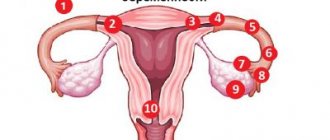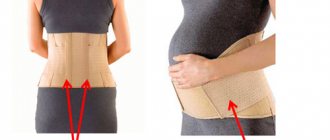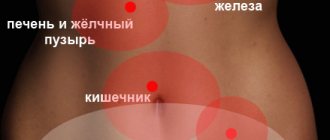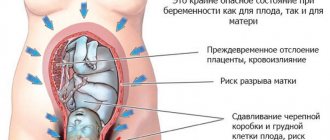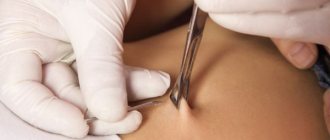Mom, look at my arms and legs
tiny fingers have grown, and I can already move them!
At the end of the second month of life, the baby receives a new name - according to medical concepts, it is now proudly called a fetus. Many systems of his small body have already begun their work, despite the fact that there is still a very long way to go.
Symptoms and signs
If some expectant mothers have not yet felt any signs of pregnancy before this period, now the following symptoms are at their maximum:
- Unstable emotions and condition.
- Unexpected bouts of crying for various reasons.
- Frequent urination.
- Unstable functioning of the gastrointestinal tract.
- The appearance of new secretions.
According to statistics, for most women, it is the 8th week of pregnancy that entails toxicosis. Perhaps this particular symptom should be considered one of the most unpleasant symptoms during this period.
Why does the lower abdomen feel tight at 18 weeks of pregnancy?
Usually, the fact that the stomach hurts does not bother a woman too much - since the pain is weak and intermittent.
However, it is still worth spending more time in the fresh air and doing gymnastics - as much as possible. Stomach pain can intensify when the causes of these pains begin to appear. If a woman has diseases of the gastrointestinal tract, then the pain may become stronger when the disease becomes chronic.
What should nutrition be like during the 13th week of pregnancy? What to do if at 13 weeks of pregnancy your stomach feels tight? The answers to these and other questions on this topic are contained in the article.
The 13th week of pregnancy is considered one of the calmest. The first examinations are already behind us, now you can completely relax and take care of your health.
A pregnant woman should pay special attention to her diet, which in turn should be as balanced as possible. This means that it must contain both proteins and carbohydrates, as well as fats and vitamins.
How does a woman feel in the eighth week?
Every day you may feel a strong aversion to a large number of foods or even smells. This is one of the signs of toxicosis, so the process is quite normal and you should not be afraid of it. It is possible that vomiting attacks will become somewhat more frequent during this period, which is also considered normal.
Of course, if you feel like vomiting more than five times a day, see your doctor for treatment, as this can lead to dehydration. This can cause some harm to the baby, so delaying treatment is strictly prohibited.
In most cases, women suffering from toxicosis vomit 1-2 times a day, which is considered the norm.
Another rather unpleasant sensation that can occur in the eighth week is heartburn. Sometimes, such a symptom cannot be avoided, but you still have the opportunity to alleviate the burning sensation somewhat by removing smoked, fried and overly fatty foods from your diet. If the craving for this food does not go away and the body literally requires such food, it is enough to simply reduce its quantity.
Body temperature level
The eighth week is included in the early stages of pregnancy, when a pregnant woman’s body temperature rises slightly. The normal temperature is 37.5 degrees.
The appearance of these symptoms is associated with an increase in the rate of metabolic processes in the female body.
If a woman does not have stomach and chest pain, and there is no toxicosis, but her body temperature has increased, it is recommended to consult a gynecologist.
A similar picture is characteristic of the inflammatory process. To detect it at 8 weeks, it is recommended to undergo laboratory tests.
If your body temperature exceeds 38 degrees, your stomach is very bothersome and you feel nauseous, you need urgent medical attention.
If this condition is prolonged, the risk of defects in the development of the embryo will increase. As the temperature of the fetus and environment increases, the baby's tissues will be damaged.
This clinic can provoke fetal fading at eight weeks. Fever and other symptoms listed above are relieved after examining the patient and determining the cause of their occurrence.
To alleviate the condition, you can use a compress of cold water. If the pregnant woman feels worse, it is recommended to take an antipyretic drug (Nurofen).
If you have pain in the abdominal area, consult a doctor. Since the eighth week is associated with the development of all internal organs of the fetus, drug therapy at this time is dangerous for it.
Gynecologists advise taking medications during this period of pregnancy after a preliminary examination and only as prescribed by the attending physician.
It is forbidden to take Aspirin during any week of pregnancy. This drug causes changes in blood clotting, which can cause bleeding.
How a woman's body changes at 8 weeks of pregnancy
By this period, weight gain is almost unnoticeable and, as a rule, does not exceed 1 kilogram. The woman herself cannot determine the correction “by eye”, so the people around you will not guess about pregnancy.
It is noteworthy that by the eighth week the breasts are already completely ready to feed the baby, so their size also increases significantly. For convenience, it is advisable to buy a bra one size larger, because constant tightening to the chest can lead to unbearable discomfort.
How to tell the difference?
There are a few simple tips that any girl can use to recognize what is really happening to her:
- As labor approaches, the pain becomes longer and stronger, and the pain does not subside after taking painkillers.
- The pain characteristic of the onset of labor covers or encircles the lower abdomen and back, as if squeezing them with a hoop.
- Real contractions differ from false ones in their regularity. If you install a special program on your phone in advance, you can calculate the period of contractions and the period of rest from them. Regular intervals indicate imminent labor. If contractions appear every 5 minutes and last a full minute, it’s time to urgently go to the maternity hospital.
- The onset of labor can also be accompanied by vomiting and diarrhea; this is a kind of cleansing of the body before the upcoming event. In addition, during contractions, the water may begin to break.
- During prenatal contractions, a woman cannot distract herself from the pain that overtakes her; she cannot sleep, eat, etc.
What happens to the uterus. Why does my stomach hurt?
Photo of the belly at 8 weeks
The embryo is already quite actively developing and growing inside the uterus, which leads to an increase in the organ itself. Moreover, at this time the uterus rises somewhat, which is felt by the woman. Such processes lead to regular minor pain or cramps in the abdomen, so do not panic if you sometimes feel discomfort. It’s another matter if pain constantly accompanies you and appears too often. In this case, be sure to call an ambulance, because you may be at risk of miscarriage .
Changing the position of the uterus can lead to stimulation of a certain nerve, which in turn will cause mild pain and heaviness in the hips and pelvic area. The pressure can be relieved somewhat by simply lying on your side frequently and spending minimal time sitting.
Frequent urination is also a cause of uterine enlargement. The fact is that the organ begins to put pressure on the bladder. There is no reason to panic, but it is imperative to consult a gynecologist if urination is accompanied by pain or discharge of any kind.
A woman at this stage. What's happening?
It's time to start thinking about changing your wardrobe. You can still put on your usual trousers or skirts - in most cases they do not yet cause discomfort in the abdominal area, but it is recommended to remove stiletto heels and platforms. Increased tension on the legs can provoke not only excessive fatigue, but also discomfort in the abdominal area.
Toxicosis at the 8th week of pregnancy can reach its apogee - very soon the intense hormonal changes will end and the nausea will subside.
However, now other not very pleasant sensations may appear - pain in the back, muscles of the legs and abdomen, pelvic area - they are inevitably associated with the growth of the uterus and the pressure it puts on neighboring organs. You may still be bothered by frequent urges to urination, complications may cause cystitis, increased sensitivity of the mammary glands, as well as possible skin pigmentation. In the early stages, mothers often experience the appearance of acne, peeling or increased oiliness of the skin. But it is quite possible that, on the contrary, you will be lucky and your skin will improve.
Taste perversions still exist - you may be drawn to salty, sour, sweet, and there is a desire to absorb those types of foods that you could not stand before pregnancy. In most cases, a return to normal will occur after the completion of the first trimester or towards the end of pregnancy.
Like last week, the expectant mother may be accompanied by sudden mood swings and emotional outbursts. Both she and her loved ones should be patient - soon everything will fall into place.
How the face changes
Many expectant mothers notice that by this time their facial skin becomes oily, which leads to acne.
Do not use any cosmetics or, especially, medications, because they can only harm your skin. This process is caused by the restructuring of hormones, so no healing creams or lotions will help you.
There are times when the face becomes, on the contrary, too dry and flaky. If the peeling itself makes you feel uncomfortable, simply moisturizing your face with baby oil is enough.
Pain in the lower abdomen with premature placental abruption
Premature placental abruption can occur both during pregnancy and during childbirth. Predisposing factors for premature placental abruption:
- abdominal trauma;
- severe gestosis;
- arterial hypertension;
- short umbilical cord;
- anomalies of labor.
During placental abruption, severe abdominal pain occurs, the woman takes a forced position, and signs of intrauterine hypoxia and internal bleeding appear. External bleeding may be absent.
The uterus is tense, painful, placental hematoma is growing. In severe cases, intrauterine fetal death is possible.
Tests and examinations at 8 weeks of pregnancy
If you have not yet been to the doctor and have only recently learned about your situation, be sure to run to the hospital. You will be given a fairly long list of tests and examinations that you will have to take in the near future.
Here is a sample list of tests:
- Biochemical analysis of arterial blood. Allows you to determine the condition of a woman’s entire body and monitor some processes.
- General urine analysis. Determines the level of sugar in the body and the quality of work of both kidneys.
- Analysis according to Nechiporenko. Pregnant women have hidden diseases that can only be found in this way.
- General blood analysis. Shows the amount of glucose in the body.
- Test for HIV and AIDS.
- Vaginal smear. It will help identify infectious diseases, among which the most common are thrush or candidiasis.
Since the disease is infectious, there are certain problems with the course of pregnancy itself when it manifests itself.
The specific impact of thrush depends on the individual characteristics of the woman’s body, but there is a list of standard problems:
- Depending on the period, candidiasis can cause miscarriage or premature birth;
- Threat of inflammation of the placenta. From a medical point of view, this pathology is called chorioamniotitis;
- The rupture of amniotic fluid earlier than expected, which is also a cause of fetal loss;
- Inflammation of the uterus immediately after childbirth;
- Infection of the birth canal, which can complicate the birth process.
For the fetus itself inside the mother, thrush does not pose a danger, but if the child passed through infected pathways during birth, he may experience certain problems:
- Firstly , candidiasis in a newborn has a direct effect on the gastrointestinal tract. Nutrients are absorbed much worse in a child’s body; moreover, the stomach often does not even accept mother’s milk. Even if you managed to feed your baby when the symptoms have subsided somewhat, it is not a fact that this food will provide really great benefit;
- Secondly , at this time, candida multiplies quite rapidly, causing allergization of the body. According to statistics, it is precisely those children who have overcome thrush who are most often allergic to certain substances. It is noteworthy that allergization may appear only several years after the infection has been eliminated. In this case, parents do not even realize that thrush is the cause of any allergy.
What doctors will you still have to go through?
After passing all the tests, you will be sent to the following specialists:
- Venereologist.
- Therapist.
- Ophthalmologist.
- Dentist.
Every doctor must be seen, since all systems of your body must work perfectly during pregnancy and especially during childbirth.
Pulling in the lower abdomen during pregnancy
Nagging pain in the lower abdomen can occur in the early stages of pregnancy and in the last weeks. 99% of these unpleasant sensations are not dangerous either for the expectant mother or for the baby in the womb. In this case, it is better to tell the gynecologist at the residential complex about your problem so that the specialist can promptly provide assistance if necessary.
Causes
In many ways, the causes of discomfort in the abdominal area depend on the period of pregnancy.
Early in pregnancy
- Sometimes it happens that nagging pain in the lower abdomen is the first sign of pregnancy. In this case, a woman may assume that this is another PMS (premenstrual syndrome). In most cases, this pain is also accompanied by a feeling of fatigue, nausea, headaches and discomfort in the mammary glands, and white mucous discharge from the genital tract. This is all due to the global restructuring of the body and changes in the hormonal background of the expectant mother.
- Around the end of the first trimester, the uterus begins to stretch as the fetus and membranes become larger and larger every day. Stretching the ligaments that support the uterus can also lead to unpleasant pulling sensations in the lower abdomen around the entire perimeter, as well as on the right or left. The growing uterus also begins to put pressure on all the internal organs surrounding it, which leads to a feeling of heaviness and dull pain. Many women also note that this problem most often worries those women who had painful periods before conception. At the same time, gynecologists do not confirm this assumption, pointing out that these are just guesses and coincidences.
- In addition to the two previous reasons, in many cases a third one is added. These are problems with the gastrointestinal tract. The hormone progesterone relaxes the uterus, and with it other smooth muscle organs (and the intestines too). Food is not digested in time and stagnation occurs, which leads to bloating, flatulence and nagging pain. As a rule, after bowel movement the problem ceases to worry the woman, but only for a while.
In recent weeks
- As at the beginning of the journey of expecting a baby, the first reason that causes a dull nagging pain is stretching of the muscles and ligaments that support the uterus.
- Braxton Hicks contractions. In this case, unpleasant sensations appear periodically, accompanied by aching pain in the lower back.
- Preparing the uterus for childbirth. The abdomen becomes hard and aching pain occurs, often before this the mucous plug comes off. This means only one thing: the end of the pregnancy period is very close.
Is it possible to get rid of pain and discomfort?
It all depends on the cause that causes aching and nagging pain in the lower abdomen.
- If these are the first signs of pregnancy, sprained ligaments, preparation of the uterus and birth canal for childbirth, then you can lie on your left side and this will certainly lead to relief. Try to avoid heavy physical activity, stress, and be sure to rest even after a regular walk. At the same time, moderate physical activity is simply necessary for a pregnant woman - remember this!
- If there is a problem with the gastrointestinal tract and you are often bothered by constipation, then in this case it is necessary to establish proper nutrition and lead an active lifestyle. What does proper nutrition mean? Include fresh vegetables and fruits, fermented milk products in your diet (homemade yogurt will be especially useful - for example, Narine), try to avoid legumes, onions, and brown bread (they cause bloating). What does an active lifestyle mean? Evening walk, light exercises for pregnant women 3-4 times a week, exercise in the pool. At this stage, this will be more than enough.
IMPORTANT! Remember that you must tell your doctor about your condition.
If, in addition to pain, there is bleeding, go to the hospital as soon as possible.
Do you have any questions? You can ask them on the FORUM
Sex in the eighth week of pregnancy
Starting from this period, experts recommend not to have sexual intercourse too often. Of course, sex is not completely prohibited, but doctors advise you to begin to restrain yourself, because it is during this period that spontaneous miscarriages most often occur for a variety of reasons, among which sex is far from the least important.
Nagging pain in the lower abdomen as a sign of pregnancy
All pain in the lower abdomen during pregnancy can be divided into obstetric and non-obstetric. Obstetric pain includes pain that occurs when there is a threat of miscarriage, ectopic pregnancy, or placental abruption.
Non-obstetric pain is often associated with problems of the digestive tract, sprained ligaments and abdominal muscles, displacement of internal organs and acute surgical pathology.
When there is a threat of miscarriage, aching or nagging pain occurs in the lower abdomen, in the lumbar region, and spotting is often associated. Such pain usually does not radiate (give) to other areas.
Without adequate treatment, cramping pain occurs, bleeding increases, the cervix shortens and spontaneous abortion or premature birth occurs. Pain in the lower abdomen can be triggered by physical activity, stress, infections or pathology of fetal development.
An ectopic pregnancy is the implantation of a fertilized egg outside the uterine cavity. Tubal pregnancy often occurs, which can occur as a tubal abortion or as a rupture of the fallopian tube.
Tubal abortion is characterized by periodic sharp or cramping pain in the lower abdomen, usually on one side. The attacks are more short-lived and are accompanied by minor bleeding.
Outside of an attack, the pregnant woman feels quite healthy. Rupture of the fallopian tube occurs at significant stages of pregnancy (8-12 weeks) and is characterized by severe, cramping pain, up to loss of consciousness and signs of intra-abdominal bleeding.
The classic symptom of pain during ectopic pregnancy is its irradiation into the anus, leg, hypochondrium or supraclavicular region.
They serve as one of the signs of pregnancy, but not always. Sometimes during pregnancy there are other signs, but pain does not appear. In other cases, on the contrary, despite the presence of nagging pain, and even delay, there is no pregnancy. In order to determine the cause of pain and confirm pregnancy, a combination of symptoms is needed, for example, delayed menstruation, nausea, drowsiness. But sometimes even these signs are not enough.
To be sure, you need to undergo a gynecological examination, and an ultrasound may be required.
Firstly, the test system you use for diagnostics may be unusable (it was stored incorrectly, the expiration date has passed). Rule out unsuitability, make sure that the test is not spoiled or expired. Secondly, pregnancy is not always the cause. We must not forget about various pathological processes, ovarian dysfunction, overwork, and the consequences of injury.
[30], [31], [32], [33]
Further tactics and strategy depend on the nature of the pain. Natural pain does not require concern. If we are talking about pathological pain, then you need to decide on further actions together with your doctor. Natural pain is associated with the new position. The body adapts, adjusts to bearing a child and future feeding.
But pathological ones arise as a result of pathological processes in the body and can pose a threat to the life of the mother and the developing organism. It is generally accepted that first-time mothers and women with hormonal problems experience physiological pain. Immunity is significantly reduced and sensitivity increases (protective mechanism).
They are caused by the fact that the uterus, which previously did not function, undergoes activation. It intensifies metabolic processes, forms its own circulatory system, and enhances nutrition. Growth causes ligaments, muscles, and skin to stretch. This is accompanied by pain and painful sensations. It may be a consequence of hypertonicity – excessive tone of the uterus.
Typically, a woman may experience pain as a result of the fact that the uterus has already grown quite strongly, stretched and began to put pressure on the nerves, blood vessels, organs, and affects the sciatic nerve located behind it. Pain may be localized in the abdomen, buttocks, and irradiate to various areas, even to the legs. Muscles can be subject to excessive stretching, leading to hypertonicity. Contractile activity of the uterus and fetal movements may be painful.
Pregnancy is a real challenge for some women. Hormonal changes are not enough for them, as a result of which mood swings occur, the appearance of new taste characteristics “I want this, but I can’t do that,” toxicosis, and so on. So also pain in the lower abdomen on the right!
To the question “why?” There are many answers:
- if a woman is pregnant, this does not mean that she cannot have diseases characteristic of the usual condition, diseases of the abdominal cavity, reproductive system organs, kidneys, liver, and so on,
- oncoming dull pain syndromes can develop as a result of physiological causes. In the first three months of pregnancy, the existing aching or nagging pain is explained by the activity of the corpus luteum located in the right ovary. An enlarged uterus has the same painful effect as
- the feeling of contractions during pregnancy, especially in the early stages, is not a good sign. In this case, the threat of miscarriage is more than likely; accordingly, treatment should occur in a hospital.
Placental abruption
Her reasons.
- hypertension or sudden changes in blood pressure, which, as a rule, have a psychogenic basis, for example, stress. Therefore, it is not advisable to attend funeral ceremonies while pregnant. And prejudice has nothing to do with it. The pressure level is also affected by the inferior vena cava compressed by the uterus;
- frequent childbirth or multiple terminated pregnancies;
- previous inability to become pregnant;
- toxicosis, gestosis, preeclampsia;
- mechanical impact on the abdominal area – injury;
- smoking and drinking alcohol during this period. There is no question of drugs, including marijuana;
- decreased amount of hemoglobin or red blood cells;
- allergy to certain dosage forms of drugs, for example, proteins or those containing blood components.
Symptomatic specifics:
- mild forms are mostly asymptomatic;
- bloody discharge “from there”;
- dizziness and sometimes fainting;
- pain in the abdomen, and its intensity depends on how strong the detachment process itself is.
What to do in such cases?
It all depends on the timing of pregnancy. If childbirth is just around the corner, then give birth. But in the early stages, inpatient treatment is necessary, including medications:
- relaxing effect on the uterus (which ones are prescribed by the doctor),
- relieving spasms: “No-Shpa”, “Papaverine”, “Metacin” and others,
- hemostatic agents: “Decinon”, “Vikasol”, ascorbic acid,
- containing iron.
If you explain it “in Russian,” it means that the uterus is tense. Why does pain arise not in places remote from it: back, stomach, lower back. Most often, the cause is a lack of progesterone, which is part of the treatment complex, and is called “Progesterone”. It is administered intramuscularly. But this is not the only factor that stimulates the tone of the uterus. These include:
- high levels of male hormones,
- high concentration of prolactin,
- poorly developed reproductive organs,
- endometriosis,
- benign tumors in the uterus,
- inflammatory processes regarding the reproductive system.
Uterine hypertonicity is almost the same as uterine tone, only the degree of complexity in the first case is higher.
These two diseases are detected by palpation and subsequent ultrasound.
Treatment is carried out in accordance with the reasons that gave rise to this diagnosis. Herbal-based sedatives are also added, for example, valerian; antispasmodics.
Doctors are afraid of adverse consequences, therefore, in order to protect the pregnant woman (and themselves) from a possible miscarriage, especially with bloody discharge, therapy is carried out inpatiently.
What it is? Simply put, the cervix has weak obturator functions. Because of this, the pregnant woman’s body is unable to hold the fetus inside itself. Among other things, with such a history, all kinds of infections can penetrate into the intrauterine area.
Why and where does this “nasty” come from?
- anatomical soil. As a result of mechanical impact on the cervix: complicated childbirth, incorrect sutures, abortions, and so on,
- functional – congenital anomaly of the uterus.
The symptoms are not specific, that is, without bleeding, pain, etc. Basically, these are signs of frequent urination. Abdominal pain and bloody discharge appear immediately when there is a threat of miscarriage.
Of course, these are not all the reasons, but they often coincide with the symptoms that interest us.
Many women experience discomfort after sex, especially during midterm. During this period, the uterus is in hypertonicity, which can have an extremely negative impact on bearing the baby.
If you experience pain, as during menstruation, and at the same time they are accompanied by dizziness, weakness, fainting, you should sound the alarm. These are the symptoms that indicate an ectopic pregnancy and miscarriage.
Severe pain in the lower abdomen in a woman in the second trimester is often a sign of premature birth. As a rule, they are observed at 7 months of pregnancy. Often this is a consequence of gynecological diseases.
Forms of premature birth:
- threatening (pulls the lower abdomen and lower back);
- beginners (cramping pain);
- started (contractions).
Such births are dangerous with serious consequences. For the mother, this phenomenon is fraught with heavy and continuous bleeding. In this case, it is not always possible to save the child, since not all of his organs are developed.
Untimely treatment of inflammatory processes is also fraught with intrauterine infections, fetal pneumonia, and heart disease.
Development of the embryo in the eighth week
External changes
This period is a real happiness for future parents, because, finally, you can see your own child on the screen of an ultrasound machine. The baby has already acquired human forms, so you can easily see the head, limbs and other parts of the body, although it is still quite difficult to determine the gender. It is noteworthy that the fetus grows at a stunning speed. Now its length reaches 13 millimeters, and its weight is 3 grams.
By the end of this week, the baby's face will almost be formed. At the beginning of the seven-day period, all organs are already prepared for formation. The legs are still shorter than the arms, but are already actively developing and growing.
Internal changes
It is in the eighth week that most women’s taste and food preferences change dramatically, and this is primarily due to the fact that the baby begins to feed through the umbilical cord and now has the opportunity to demand certain foods. The placenta is actively developing and getting stronger every day, so the baby now needs the maximum amount of nutrients. Which ones exactly - he will tell you himself, influencing your desires and requirements.
At this stage, the child’s heart is already four-chambered, so it functions almost fully. With the help of special equipment you can clearly hear the heartbeat.
By this time, the sex is completely determined, moreover, the genitals are fully formed.
The most important process at this stage is the active formation of the nervous system, which has been going on for three weeks. The brain is also still developing.
The baby’s body gradually becomes stronger, thanks to the ossification of the skull and the entire skeleton.
Therapeutic recommendations
If the eighth week is accompanied by pain in the abdominal area or general malaise, to normalize the condition, it is recommended to rest fully and avoid physical activity.
If a woman gets up to go to the toilet frequently at night during pregnancy, the uterus has already begun to put pressure on the bladder. To shorten your trips, do not drink liquid a few hours before bedtime.
Sometimes the 8th week is accompanied by shortness of breath, shortness of breath, and rapid heartbeat. In this case, it is recommended to frequently ventilate the room.
Otherwise, the manifested symptoms will negatively affect the course of pregnancy, which will provoke panic in the pregnant woman and pain in the peritoneum and uterus.
To prevent the occurrence of the clinic in question, you must not smoke and stay away from people who smoke.
Scientists have proven that nicotine can not only provoke toxicosis and nagging pain in the uterus, but also hypoxia in the embryo.
Since many medications are prohibited during pregnancy, a woman should take care of herself. Pregnancy causes a woman's health to deteriorate.
This is due to toxicosis, and after 8 weeks - the growth of the fetus and its active activity in the womb.
Often in the first months of the period under review, pregnant women complain of burning pain in the pelvis and hips, which can spread to other parts of the body.
At the same time, nausea may bother you, as a woman’s culinary desires have changed. Due to severe hormonal imbalance, the patient may complain of vomiting, dizziness, weakness, and chest pain.
If you experience severe nagging pain in the lower abdomen, you can take a painkiller prescribed by your gynecologist.
The above clinic can be supplemented by varicose veins. An active life is indicated to prevent it. It is recommended to pay special attention to the condition of the skin.
Often it changes, peels, becomes covered with pimples and spots. This phenomenon is also associated with changes in hormonal balance.
The growth of the tummy in the eighth week is accompanied by a “peak” of toxicosis. Many pregnant women claim that by this time they have become accustomed to constant nausea, dizziness, and irritation.
Especially in pregnant women, constant tearfulness, emotional instability, and irritability are observed.
Gynecologists advise preventing such conditions by protecting pregnant women from stress and nervous disorders.
The woman herself must be patient, since the first trimester will be replaced by the second trimester, when toxicosis goes away.
In a new period of life, a pregnant woman will encounter the “golden time” - the second trimester, which is characterized by peace and complete calm. This course of the new period of pregnancy is considered normal.
With severe toxicosis in the first trimester, the patient may lose weight. Therefore, such pregnant women are hospitalized in the gynecological department.
They are prescribed when there is no threat of dehydration, and toxicosis and pain in the peritoneum and uterus have disappeared. Modern gynecologists believe that the main cause of nagging pain in the tummy is an incorrect menu.
A balanced diet can also eliminate toxicosis. At the same time, during this period, a pregnant woman should think about preventing signs of late pregnancy.
To prevent the risk of developing varicose veins, it is recommended to avoid wearing high-heeled shoes. It is better to walk more in the fresh air, breathe forest and sea air more often, and enjoy life.
Scientists have proven that from the eighth week of pregnancy, a certain focus of excitation is formed in the mother’s cervix - a “dominant pregnancy”.
He is the main “guide” of a woman during the period of gestation, determining her reaction to protecting the baby. This focus directs the pregnant woman’s thoughts towards caring for herself and her child.
Advice for pregnant women
- Don't change your lifestyle unless necessary. If you do not feel any discomfort at all, you can continue your normal lifestyle, of course, after consulting with your doctor.
- More fresh air. If fatigue and drowsiness constantly haunt you, be sure to spend more time outside. Doctors say that regular walks help to minimize the manifestation of such symptoms.
- Taboo on alcohol and nicotine. If the pregnancy was not planned and you have not given up bad habits in advance, stop using such substances immediately. During the formation of the baby's nervous system, you have the opportunity to significantly disrupt its development by drinking alcohol or cigarettes.
- Taboo on gravity. The eighth week, as stated, is quite risky in that the threat of miscarriage at this time is greatest. Even minimal stress can cause the loss of a child, so give up all difficult tasks.
- Take care of your health. Immunity is low at this time, so you should treat yourself as carefully as possible. Remember that any disease can be a threat to the fetus. Remember to take medications prescribed by your doctor.
Lab tests
After examination, the patient is prescribed laboratory tests. With their help, the doctor will establish the main indicators of urine and blood, determine the health status of the patient and the fetus.
At week 8, it is recommended to take the following tests:
- urine test to detect protein;
- blood test to determine the level of leukocytes and red blood cells;
- determination of the Rh factor;
- stool analysis;
- general smear;
- hCG analysis.
If at 8 weeks there is no belly, but a high level of protein is detected in the urine, the pregnant woman suffers from kidney diseases. To create a complete picture of pregnancy, it is recommended to take a general blood test.
If not only nagging pain in the abdomen appears, but also the number of red blood cells has decreased, while the head is dizzy, frequent fainting is observed, the pregnant woman has anemia, leukemia, and pulmonary pathologies.
A low white blood cell count during pregnancy at 8 weeks indicates viral hepatitis and rubella.
A high concentration of this indicator indicates a bacterial infection.
The level of the hormone, which is produced by the membranes of the embryo during normal pregnancy, constantly increases.
In this case, an analysis for hCG confirms the normal course of the gestation process.
Finger joints hurt during pregnancy: causes of pain in the hands
Have you been trying to heal your JOINTS for many years?
Head of the Institute for Joint Treatment: “You will be amazed at how easy it is to heal your joints by taking every day...
Read more "
During pregnancy, many women complain to the doctor about pain in the joints of their fingers. This phenomenon is quite common and characteristic of the female body during the process of bearing a child. At this time, pain appears not only in the hand and joints of the arms.
Often a woman notices pain in the knee joints and feet. It is still not known for certain why such sensations appear.
However, pain is associated with the stress that the body experiences during pregnancy.
Characteristic symptoms
According to statistics, during pregnancy, approximately 70% of women experience pain in their arms, back and legs. This phenomenon is called “carpal tunnel syndrome.” As a rule, these long-term pains stop after the birth of the child. But some young mothers suffer from this syndrome for some time.
Pain in the arms appears in a woman in the third trimester of pregnancy. Then the expectant mother actively gains weight. Also, along with joint pain comes swelling of the entire body.
The joints of the fingers of pregnant women hurt because there is compression of the neural tubes that connect the hand to the arm.
The stable functioning of the nerves is disrupted, and the woman feels pain in her fingers. However, long-term pain is not the only symptom of carpal tunnel syndrome. As a rule, it is accompanied by:
- Frequent itching and burning in the fingers and palms, as well as pain in the forearm.
- Strong, sharp and sudden nature of appearance.
- Weakness of the fingers, slight numbness of the hand.
- Numbness in each finger.
It is quite easy to reduce the frequency of such pain. To do this, you need to avoid sleeping with your hands under the pillow, and if pain occurs, stretch your hands and move your fingers. The hands will be developed by having the woman move her hands throughout the day and massage.
Monotonous work, which often causes hand pain during pregnancy, should be avoided. You can’t keep your hands down all the time; this will cause a strong rush of blood and swelling of the limbs.
The cause of such painful sensations is arthritis or arthrosis. If a woman has previously been diagnosed with these diseases, it is important to tell the doctor about it. In addition, a young mother may be at risk, and such diseases may appear or worsen during pregnancy.
As a rule, all such symptoms disappear after the birth of the child. Over the course of several months, the woman sees the disappearance of edema, and the body begins to recover. But if the pain does not go away, you need to consult a doctor.
Pain in the hand may occur due to disruption of the nerve canals. If this defect does not go away after pregnancy, it is worth finding out why, since such deformities require surgery.
After surgery, the pressure on the nerve should decrease and unpleasant symptoms should disappear.
Why do joints hurt?
Pain in the arms, back and legs can be caused by inflammation in the joints. After conception, a woman’s body weakens greatly, and the functioning of the immune system becomes worse.
If a woman has been diagnosed with chronic joint diseases, then an exacerbation may begin during pregnancy. In this case, it is important to consult a doctor.
The same banned issue for which Ernst fired Malakhov!
Joints and cartilage will be cured in 14 days with the help of ordinary...
The doctor must prescribe the necessary treatment course that is best suited. You cannot self-medicate at all stages of pregnancy.
This precaution is due to the fact that during pregnancy it is undesirable to use medications for joints. This can cause harm to the mother or fetus.
The joints of the hands often hurt due to vitamin deficiency and lack of nutrients in the body. In many cases, we are talking about a lack of calcium.
During the process of bearing a child, you should consume a large amount of calcium per day, provided there are no allergies. Calcium is available in the following foods:
- cottage cheese,
- milk,
- cheese,
- ryazhenka,
- kefir,
- seafood.
If a pregnant woman eats unbalancedly or incorrectly, this can cause pain in the joints of the hands.
To determine the level of calcium in the body, a blood test should be done. Biochemical analysis will show the degree of calcium saturation. If a woman does not have enough calcium, her doctor may prescribe her a special diet, as well as dietary supplements.
Quite a few joints hurt after pregnancy and during gestation due to large amounts of the hormone relaxin. This substance is produced in all pregnant women and is involved in the process of bearing a child. Relaxin primarily reduces joint stiffness. Otherwise, the hip bones simply will not move apart under the pressure of the uterus.
The hormone relaxin has a side effect - pain in the limbs. If a woman experiences pain under the influence of this hormone, nothing needs to be done. It will not be possible to fight relaxin with medications.
After normalization of hormonal levels, joint pain goes away on its own.
Elimination of pain
During pregnancy, the joints of the hands are often subject to prolonged pain. To avoid discomfort, you should perform small exercises.
Exercise improves blood circulation. Hands are warmed up very carefully. If the manipulations are unpleasant and painful, it is best to stop them. It is important not to wear bulky, heavy jewelry.
To reduce pain in your hands, you can:
- rub your hands
- apply cold to the joint without overcooling it,
- Keep your hands in cold water, this will relieve swelling.
To improve blood flow, you need to raise your arms up. For pain in the hand or back, it is best to massage, that is, thoroughly massage each finger, then the entire hand, moving up to the elbows and shoulders. If massage is done systematically, it will significantly reduce pain and improve blood circulation.
As you know, young mothers often suffer from knee pain. To solve this problem, you can use essential aromatic oils. The effect of oils is almost always underestimated.
You need to take a small bowl of warm water and add 3 drops of oil. A piece of cloth or gauze bandage is soaked in such water and applied to the diseased area.
There is an effective remedy for swelling - juniper oil. However, during pregnancy, such treatment can bring unexpected effects and negatively affect the woman’s well-being. Therefore, it is better not to use it for pregnant women.
Active pressure points on the palms of the hand
Impact on the main points on the body copes with any pain. You need to turn your hands upside down and grab your wrist. Place 2 fingers of the other hand on the crook of the first hand. On the line next to your fingers you will find the desired point.
You need to press on the point. If a dull pain appears, then the point has been found. You need to press on it for about 8 seconds. The exercise should be repeated at least three times. The same thing needs to be done with the other hand.
A fairly effective method of eliminating pain is reflexology. This technique consists of a special effect on the human foot. At a distance of two centimeters from the ring finger, you need to feel the point. When pressed, a painful sensation will appear. Press on the point for about 10 seconds. The pain goes away quickly and for a long time.
Doctors do not recommend taking homeopathic remedies on your own. It is best to consult a doctor before choosing a particular course of treatment that will include homeopathic preparations for the treatment of joints.
Effective folk remedies
If your back hurts after childbirth, there is an effective method - relaxing baths with the addition of sea salt. You need to pour about 250 g of sea salt into the bath, and essential oils if desired. The procedure lasts about 20 minutes.
Instead of sea salt, you can use bran. To do this, boil 1 kg of fresh bran for about 15 minutes. The infusion is filtered and poured into the bath.
Pain in the hand and joint, as well as swelling, are well relieved by pine baths with birch. You need to take 1 kg of birch leaves and boil them in seven liters of water for about half an hour. Birch leaves can be replaced with a kilogram of pine needles. After the mixture has boiled, you can strain it and add it to the bath.
Quite often, viburnum and lilac are used for pain in the hand. These plants have a wide range of beneficial properties. Recipes for preparing lotions and decoctions from these plants vary.
Sore spots are rubbed with lotions before going to bed. At this time of day, the body is relaxed and can fully accept all impacts.
If the joints hurt for a long time, use a remedy based on vodka and honey, making compresses. Bandages are soaked in the liquid and wrapped around the hands. Vodka warms the bones, and honey nourishes the joints.
Discharge - normal and pathological
As a result of hormonal changes that occur during pregnancy, expectant mothers often experience bloating, constipation and intestinal dysbiosis. These conditions can be triggered by errors in diet, a heavy dinner, or insufficient physical activity.
The pain is nagging or aching in nature, often occurs in the second half of pregnancy and can be accompanied by nausea, vomiting, heartburn and belching. In advanced cases, a threat of miscarriage may develop.
The growing uterus increases the load on the ligaments that support it in the pelvis. In addition, due to the increasing size of the uterus, the pelvic organs are displaced.
The abdominal muscles also experience increased stress during pregnancy and become stretched and pulled apart slightly.
The pain associated with this is minor, aching, but can also be stabbing. If the pregnant woman's belly is large (large fetus or multiple pregnancy), an umbilical hernia or linea alba may develop.
In the later stages of pregnancy, a slight divergence of the pelvic bones occurs, which is also manifested by moderate pain in the lower abdomen.
